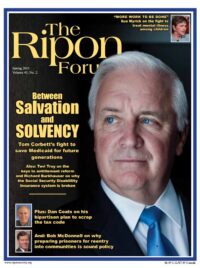
Preparing prisoners for successful re-entry into communities is not soft on crime; it is sound public safety policy. It creates an opportunity to reduce recidivism, and reflects the idea that America is a nation which believes in second chances.
In 1995, Virginia abolished discretionary parole and implemented “truth-in-sentencing.” Under this system, all felony offenders must serve a minimum 85% of their prison or jail terms before earning good time credit. As a former prosecutor and Virginia Attorney General, I strongly support the “truth-in-sentencing” criminal justice approach, and believe that those who commit a crime must take complete responsibility and fully repay their debt to society. However, we cannot ignore the fact that 90 percent of offenders will be released into our communities. Thus creating successful re-entry programs is not optional.
Currently in the United States, over 4 million adults are on probation or parole. In 2010, Virginia released over 13,000 state offenders who had completed their prison sentences. Further, over 55,000 of our state offenders are on community supervision. Additionally, at the jail level, over 50,000 inmates were released after serving their time in local jails. These numbers are significant.
For each offender who recidivates, it means a new crime and a new victim. Two-thirds of those who come out of prison are re-arrested within three years of release. In addition to new victims, recidivism means more human suffering and higher costs to the taxpayer through police and court process, as well as re-incarceration.
As a former prosecutor and Virginia Attorney General, I strongly support the “truth-in-sentencing” criminal justice approach, and believe that those who commit a crime must take complete responsibility and fully repay their debt to society.
Re-incarceration also significantly impacts families and children of the offender who are left unsupported and may require public assistance for an extended period of time. Studies show that children with an incarcerated parent are more likely to suffer from negative social impacts, and are denied economic stability due to the loss of the wage-earning ability of the incarcerated parent.
Re-incarceration also impacts businesses and communities. Communities are faced with having to deal with crime and victimization, as well as the loss of revenue that comes with a thriving and safe community. Victims of crime experience loss of productivity because of disruption in their jobs and in their personal lives. They also suffer the emotional trauma associated with victimization.
Recently, the Pew Center on the States released its findings regarding recidivism around the country. Among the 41 states that report felon recidivism as re-imprisonment within three years of release, Virginia has the fifth lowest recidivism rate. Virginia also has the seventh lowest crime rate in the Nation. Although both rates are low, I continue to believe that we can and must do better.
Instituting effective collaborative and evidence based re-entry practices in the criminal justice system is smart and good government. Upon taking office as Governor in January 2010, I appointed Virginia’s first-ever statewide prison re-entry coordinator and directed all my agencies to collaborate on re-entry issues as well as incorporate re-entry related policies and practices into their mission and work plans for effective service delivery.
Re-entry preparation must start at the time of admission to prison or jail. This is true for adults and juvenile offenders. In Virginia, we have developed a four year re-entry plan to address the transitional needs of juveniles and adults. This includes offering programs that address criminogenic needs designed to help change criminal thinking habits and help offenders practice socially responsible thinking and behavior during incarceration.
However, we cannot ignore the fact that 90 percent of offenders will be released into our communities. Thus creating successful re-entry programs is not optional.
In Virginia, we have developed strategies that require offenders to take responsibility for their own preparation for re-entry and to work with their families or support groups in preparing for eventual release.
Virginia, like many other states, is facing budgetary challenges and has had to make difficult decisions. This process presents an opportunity for us to better leverage our resources to develop well reasoned re-entry policies that are evidence-based for offenders who are high risk for victimizing again.
Fiscal responsibility and cost effectiveness are promoted by targeting resources towards offenders with higher criminal risk factors. A strong focus on re-entry requires our Department of Corrections and Department of Juvenile Justice to shift some organizational practices and policies. Corrections officials have been asked to ensure that operations and programs are research-based and that services are provided to address transitional needs.
Not all offenders will take advantage of the opportunities with which they are provided. Some will commit new crimes or will fail to comply with the conditions of probation or parole supervision. That is a reality we face. For those individuals, the application of swift and strong punishment through our criminal justice system is imperative.
Public safety is a priority of state government. Consequently, in addition to ensuring that law enforcement and the rest of our criminal justice system have the resources necessary to keep our citizens safe and their property secure, risk control should be a priority. Corrections agencies should incorporate re-entry strategies with existing correctional tools to reduce future victimization and create safer communities.
In addition to incapacitation, corrections officials must take an active role in the reduction of crime by preparing offenders for success through a continuum of services and supervision. This is done, in collaboration with state and local partners, from the time of the offender’s entry into prison or jail through his or her reintegration into the community.
Modern innovative public safety policies must include prisoner re-entry in any state strategic plan. It is not only smart public policy; lives depend on it.
Bob McDonnell is the Governor of the Commonwealth of Virginia.




